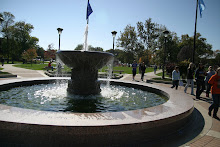By Brendan Dugan
A number of amenities and activities have been banned from US college and university campuses from tobacco and alcohol to pets in dorms, from hazing to demonstrating and rioting.
Even bottled water gets the boot.
From Seattle to New York, colleges are kicking the plastic habit.
As of September 2011, eleven US colleges and universities have banned the sale of bottled water and removed them from vending machines, dining halls, and campus events.
Eleven more have area, school, or department-specific bans.
At another seven, student-led campaigns fight to remove the sale of bottled water.
And for good reason: the Government Accountability Office (GAO) estimated that roughly three-fourths (76%) of common plastic bottled water containers in the US went unrecycled in 2006.
That amount ranges from 632,655 to 999,001 tons of common plastic waste. Altogether, this makes up from 26 to 41 percent of the 2.4 million tons of plastic the US discarded in that year.
Peter Gleick, a freshwater expert and author of "Bottled & Sold: The Story Behind Our Obsession with Bottled Water," observes the alarming trend of bottled water dependence in the US. Thirty-five years ago, only a gallon and a half, or a dozen sixteen-ounce bottles, of bottled water was consumed per person each year.
"By 2008, the number had grown to about 30 gallons of bottled water per person in the US, " which is "close to 9 billion gallons," he said. That’s 240 sixteen-ounce bottles.
"Americans now drink more bottled water than milk or beer," he said.
Most institutions make the move alongside students and faculty as a practice of sustainability. Director of sustainability Judy Purmanat of St. Benedict in Minnesota said, “a committee of students, faculty and staff proposed the idea last year. Nearly 1,000 students [roughly half the student body] signed a petition supporting the ban.”
Many campuses, including St. Benedict, have installed "hydration stations," additional fountains specifically for students to fill their individual containers. Students can buy bottled water from other local vendors.
Such policy has met resistance, however. At St. Benedict, a private catholic college where the ban was recently enacted, a Republican student group objected to the ban on the grounds that it "takes away students’ free choice.”
The source of complaint and resistance is that the "free choice" to buy bottled water on campus is no longer an option. The very fact that relatively clean and easy-access water is within walking distance highlights a monumental privilege these students have likely never gone without and apparently take for granted.
Here, petty consumer concerns are weighed against one of ecological conservation. You don’t have to hug trees to understand that trash piles up, and not just in landfills. The problem of our collective waste won’t resolve itself.
Marian would do well as a community to consider reducing or banning bottled water sales on campus and use by campus events. Not to walk in the shoes of a typical liberal, but as a member of an institution that heralds responsible stewardship as a fundamental value, Marian should join similar schools and spearhead the ecologically sustainable college movement.
skip to main |
skip to sidebar

The Knight Times is a student newspaper dedicated to serving the Marian University student community. Our goal is to inform the Marian community on campus, local, and global issues. We strive to report the stories that matter and take student opinions and comments into consideration. We want you to read, comment, and enjoy!
Welcome to

- The Knight Times
- The Knight Times is a student newspaper dedicated to communicating campus, local, and global issues to the Marian University student community. We want you to read, comment and enjoy!
Photos Taken By:
Michael Schrader
David Leszcynski
Michael Schrader
David Leszcynski
Blog Archive
-
▼
2011
(20)
-
▼
November
(8)
- Knights become No. 1 ranked team in NAIA
- IN BRIEF - ANYTHING AND EVERYTHING
- By Matt DuncanMarian University Sophomores Matt Du...
- Marian offers special topics courses for spring ’12
- Marian should ban bottled water
- Study Abroad Program sends students ‘anywhere on t...
- Crystal Vicars-Pugh showcases art at MU
- Sophomores hold nondenominational worship service ...
-
▼
November
(8)
Stay Tuned for our NEXT Issue...
February 24 2012